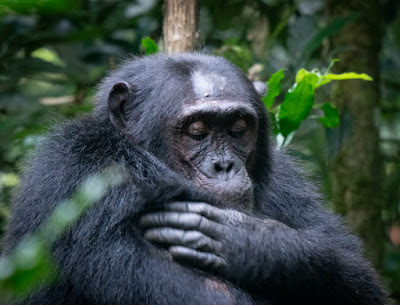February 17 – Day 4
We stumble down to the lobby at 4:45 am to pick up our park breakfast packages, which the hotel staff have kindly prepared, and climb in to Davis’ van. Driving to the Kibale Park entrance in the dark, we see it is fairly misty. The reception area is a short drive from the gate, and we are pleased to find the latrine facilities are clean and well-stocked.
At the briefing we learn there are 13 different chimpanzee groups within the park, and these will break up to travel in small communities of variable size. Habituation of the primates involves exposure to humans on a daily basis for 5 years or more. In the 25 years the program has been in place, 3 groups have become fully habituated and 1 more is partly so. The remainder will continue to be wild, to allow the experts to study the effects of habituation on the groups compared to control groups.
We are one of two groups signed up for the habituation tour which involves searching for the partly habituated group and spending 4 hours following them. The trekking tour, by contrast, involves a one hour trip to a fully habituated colony, where the individuals are much less shy and tolerate close contact with humans for long periods of time, allowing for better photo opportunities.
 |
| Getting dropped at trail head |
We are introduced to Meelka, our main tour guide, along with the younger guides, Daniel and Moses. The guides all carry rifles. All 10 of us are crowded back in to the van with Davis, and he drops us by the side of the highway at the trail head. The first half km or so of the march finds the trail to be wide enough for 2 abreast and quite flat and worn. We enjoy the cool morning air and sounds of the forest birds and other creatures. Following that we repeatedly take smaller, narrower and less traveled paths stopping every once in awhile to listen for the distinctive chimp screams. Meelka stops after an hour or so and advises we are near the park boundary, and it is possible the chimpanzee group has ventured into the nearby village, which they sometimes do in search of crops, dog food, or other delicacies.
Backtracking, we are finally rewarded with some occasional screams, punctuated by thumping on tree trunks, which signal the presence of the beasts we hunt. Meelka points out a couple of individuals high in trees. They will rest on a branch and reach out to pluck leaves, caterpillars, or other insects. Chimps grow to about 4 ½ feet height, with broader chests and more musculature than humans. They need to eat 5 kg of food daily, which requires almost constant feeding on these small snacks. They are omnivores, and will sometimes hunt monkeys or infants from a rival group. They are very athletic as they move through the branches and scurry up and down the trunks. On rainy days, they prefer to remain up in the forest canopy, so we are thankful today is dry and the heat will encourage them down to lower levels and the forest floor.
 |
| Tramping through the underbrush is exhausting |
 |
| A good deal of the time is spent up in the forest canopy |
The sounds that fill the environment when 3 or 4 chimps are calling to each other in angry-sounding screams is simply awesome. Visibility was often obscured by leaves and branches, but occasionally we have the honour of approaching within 6 or 7 m of an individual lounging and doing some self-grooming on the crook of a trunk only a foot or 2 off the ground. They can move very quietly along the forest floor, but occasionally one will start running and crashing through the brush, sometimes passing within only 3 or 4 metres of the startled tourist.
Wandering through the forest off the paths through thick underbrush to follow these creatures becomes exhausting, and we finally decide to head back to the trailhead, anticipating the grueling hike back. By then it is approaching noon and we are wilting in the full heat of the day. Overall, the experience has been amazing but we eagerly anticipate a shower, a swim, and perhaps a nap.
An afternoon rainstorm complete with hail thwarts any plans to visit the pool. All of us are too tired to muster enthusiasm for a trip to a downtown restaurant, so we take advantage of the hotel dining room, then again head early to bed.






No comments:
Post a Comment